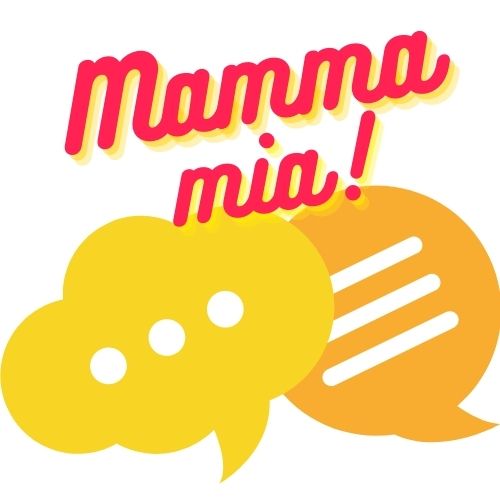Every language has its own idioms and expressions, and the Italian language is no exception. There are many useful phrases in Italian.
Idioms are expressions that have a cultural connotation and are not intended to be taken literally.
Here are 10 Favorite Italian Expressions that will help you expand your vocabulary and sound like a native speaker. Even more idioms and phrases have been added!
1. Mamma mia! (My goodness!)
Don’t think that Italians are like children because they call for their mommies so often. Italians use “Mamma mia!” to express surprise, impatience, happiness, sorrow—any strong emotion.
- Mamma mia che bella casa!
- Mamma mia che noia!
- Mamma mia! che sorpresa!

2. Che bello! (How lovely!)
Using this phrase, you show that you’re enthusiastic about something.
Che bello! Finalmente in vacanza!
3. Uffa! (Aargh!)
“Uffa! ” is a clear way to show that you’re annoyed, bored, angry, or fed up.
Uffa, questo libro che ho comprato non mi piace per niente
4. Che ne so! (How should I know?)
When Italians want to say that they have no idea, they shrug their shoulders and say “Che ne so!”
- Sai dove è andata tua sorella?
- Che ne so!
5. “Magari! (If only!)
“Magari” is just one word, but it expresses a lot. It indicates a strong wish or hope. It’s a good answer if, for instance, somebody asks you if you’d like to win the lottery.
- Ti piacerebbe andare in vacanza alle Maldive?
- Magari!
6. Ti sta bene! (Serves you right!)
“Ti sta bene!” is the Italian way to say “Serves you right!”
- Ho perso tutti i miei soldi al lotto!
- Ti sta bene!
7. Non te la prendere! (Don’t get so upset! / Don’t think about it!)
If you see that somebody is sad, worried, or up” “upset, you can try to console him by saying “Non te la prendere!”
Dai, Barbara, non te la prendere.
8. Che macello! (What a mess!)
Figuring out the derivation of “Che macello!” isn’t difficult. The literal translation is “What a slaughterhouse!”
La tua camera è un disastro! Guarda che macello!
9. Non mi va! (I don’t feel like it!)
“Non mi va!” is one of the first phrases that Italian children learn. It means that you don’t want to do something.
- Andiamo al mare oggi?
- No, non mi va!
10. Mi raccomando!” “(Please, I beg you!)
With “Mi raccomando!2, you express a special emphasis on asking for something.
Telefonami, mi raccomando! “(Don’t forget to call me, please!)”
What’s next?
You might want to keep learning Italian online with these free resources:










Leave a Reply